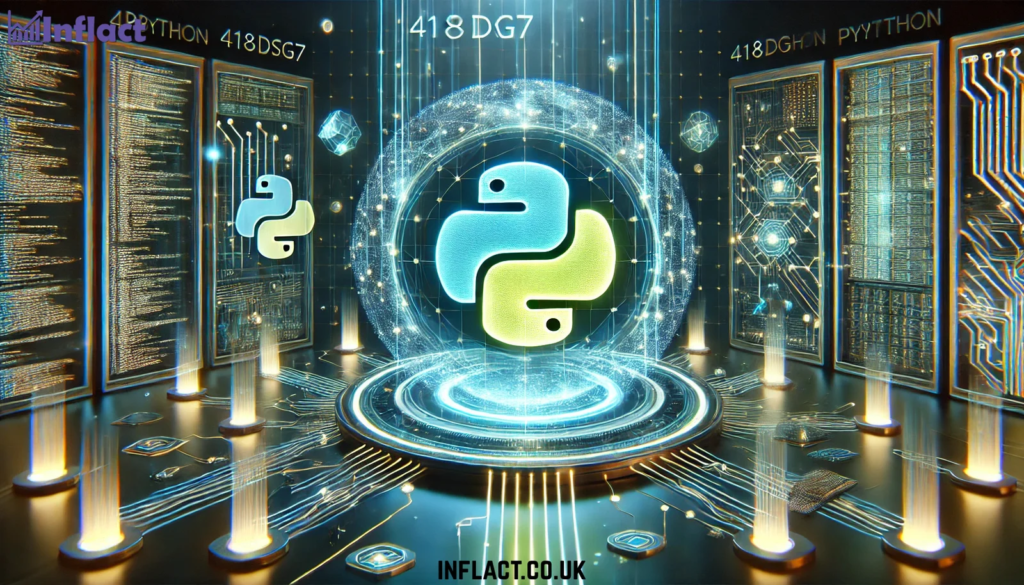The digital age thrives on innovation, and when it comes to automation, data manipulation, and intelligent scripting, Python continues to lead the charge. However, a lesser-known but rising star in specialized Python applications is 418dsg7 python. If you’ve stumbled upon this term and are wondering what it’s about, you’re in the right place.
In this detailed guide, we’ll explore the nuances of 418dsg7 python, from its origin to practical use cases, its relationship with standard Python development, and why it’s poised to play a transformative role in certain tech domains.
What Is 418dsg7 Python?
At first glance, 418dsg7 python might sound like a cryptic code or an internal module identifier. In reality, it’s a custom Python framework or module cluster designed to address advanced scripting problems, particularly in environments involving data encryption, automation, machine learning, and modular plugin systems.
While not officially part of the standard Python library or common packages like NumPy or Pandas, 418dsg7 python appears in custom environments, typically in organizations seeking advanced control over data workflows, cross-platform scripting, or proprietary encryption models.
It’s modular. It’s powerful. And most importantly, it’s built for scale and security.
The Origin and Evolution of 418dsg7 Python
418dsg7 python did not emerge from the open-source community like many libraries you might be used to. Instead, its origins are rooted in enterprise and research-based development, where the goal was to merge low-level system control with Python’s high-level syntax. It’s believed to have started as an internal toolset for managing secure data pipelines, and over time, evolved into a more comprehensive architecture.
Some key aspects include:
- High-speed cryptographic functions
- Abstracted plugin systems
- AI integration points
- Custom runtime environments
With growing cybersecurity concerns and the demand for faster, more dynamic scripting solutions, tools like 418dsg7 python have found a unique niche.
Why Developers Are Turning to 418dsg7 Python
In a sea of frameworks and libraries, you might ask: Why bother with 418dsg7 python?

1. Performance and Security
One of the standout reasons for adopting 418dsg7 python is its emphasis on performance optimization while maintaining security. Many developers working in environments that handle sensitive data find that traditional Python libraries lack the encryption layers or customizable access control provided here.
2. Custom AI Integration
Unlike mainstream AI libraries like TensorFlow or PyTorch, 418dsg7 python is designed to integrate machine learning with modular adaptability. For instance, one module can be swapped out for another at runtime without affecting the core ML model.
3. Embedded Systems Support
Its architecture is highly modular and lightweight, making it perfect for IoT and embedded system development. The 418dsg7 module can run on constrained hardware, which is not always possible with heavier Python frameworks.
Core Components of 418dsg7 Python
Let’s break down the most vital components that make this framework stand out.
Modular Engine Core
The engine acts as the brain of 418dsg7 python, controlling how data is handled and passed between modules. It supports both synchronous and asynchronous pipelines.
Dynamic Loader
One of the more unique aspects is its hot module reloading system. The dynamic loader watches for changes in modules and can update them in real-time without needing to restart the application.
Cryptographic Interface
At the heart of 418dsg7 python is a built-in cryptographic engine supporting:
- AES-256
- ECC (Elliptic Curve Cryptography)
- Hash chaining for data validation
- Quantum-safe key rotation models
AI & Data Hooks
It features data hook systems that allow developers to inject AI models directly into data streams. For example, a model can be trained on user activity and immediately begin influencing the behavior of another module.
Real-World Use Cases for 418dsg7 Python
Let’s look at how and where this powerful tool is actually being used.

1. Secure Enterprise Automation
Large corporations use 418dsg7 python to automate internal tasks like:
- HR data handling
- Secure logging and auditing
- Encrypted API communication
With built-in access controls and audit logging, it meets many compliance needs (GDPR, HIPAA, etc.)
2. Edge AI on IoT Devices
Since it’s lightweight and modular, developers use it in devices like:
- Smart security cameras
- Industrial IoT sensors
- Wearable health devices
The framework’s ability to swap modules and run locally means faster processing and less cloud dependency.
3. Blockchain Development
A growing use case is in smart contract prototyping and chain data validation. 418dsg7 python offers a sandbox for simulating distributed environments.
How 418dsg7 Python Differs from Traditional Python Libraries
Here’s a breakdown of differences:
| Feature | Traditional Python | 418dsg7 Python |
|---|---|---|
| Runtime Modularity | Limited | Advanced |
| Cryptography | Optional (via libs) | Built-in |
| AI Integration | Manual | Plug-and-play |
| Use in Embedded Systems | Varies | Highly supported |
| Data Stream Manipulation | External tools | Native hooks |
| Security Logging | Manual | Integrated |
The keyword 418dsg7 python stands as a representation of a broader need for a new class of Python-based tools that blend security, adaptability, and performance.
The Future of 418dsg7 Python
As the tech world moves toward zero-trust architectures, edge computing, and AI-enhanced automation, tools like 418dsg7 python are set to dominate niche but critical roles. Its potential future includes:
- Public SDK releases
- Integration into cybersecurity toolkits
- Expansion into open-source governance
- Native mobile SDK support
While still a bit underground, the growing interest from fintech, healthcare, and defense sectors is a strong indicator of its staying power.
Final Thoughts on 418dsg7 Python
To sum it up:
- 418dsg7 python isn’t your everyday scripting tool.
- It’s a modular, secure, and AI-ready Python-based framework.
- Perfect for developers who demand power, privacy, and performance.
- Ideal for IoT, AI workflows, secure automation, and scalable enterprise-grade applications.
Though currently somewhat niche, it is a blueprint for what the next generation of Python frameworks may look like.
If you’re a developer looking for more control, deeper customization, and advanced encryption built directly into your workflow, 418dsg7 python might just be your new favorite tool.
For more information visite the website

